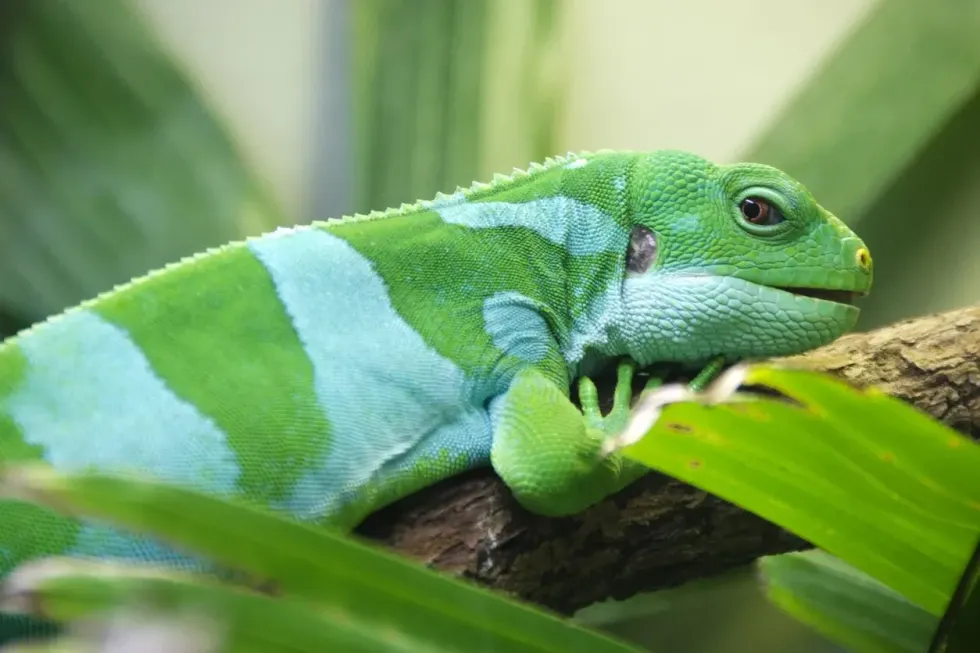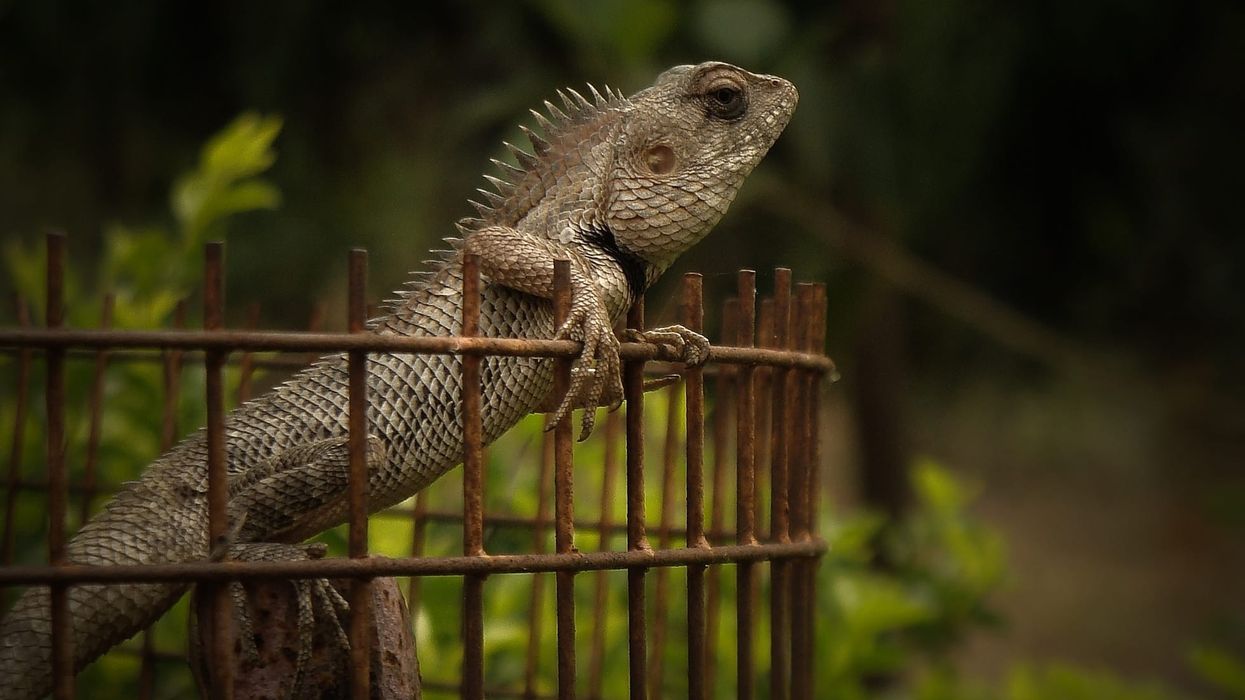Exclusively available on the Fijian islands, Fiji banded iguanas (Brachylophus bulabula) are tree-dwelling lizards. The beautiful green-colored species are diurnal so they spend all their day foraging in forests, protecting their territory, feeding on leaves and flowers, and strolling and enjoying the warmth of the sun. The green color of the iguanas helps them to camouflage.
This species, native to the Fijian islands, is presently extremely endangered due to the presence of predators who prey on these reptiles, and their eggs and mostly from uncontrolled human activities.
Apart from habitat loss and the introduction of predators, their high demand in the pet trade is one of the reasons for their vulnerable status on the Fijian islands. These iguanas are known to be one most intelligent reptile species yet very calm and composed.
They possess a sharp memory and excellent recognition skills as they respond to their owners through sights and sounds.
If you enjoyed reading these engaging facts about the vulnerable Fiji banded iguana then also take a look at some amazing facts about other lizards namely the monitor lizard and iguana.
Fiji Banded Iguana Interesting Facts
What type of animal is a Fiji Banded Iguana?
The Fiji banded iguana is a species of lizard belonging to the family of Iguanidae.
What class of animal does a Fiji Banded Iguana belong to?
The Fiji banded iguana belongs to the class Reptilia.
How many Fiji Banded Iguanas are there in the world?
The numbers are alarmingly small with 10,000 adults or even less in the Fijian islands.
Where does a Fiji Banded Iguana live?
Fiji banded iguanas are found in the Fijian archipelago. They can be located in Vanua Levu, Lau Islands, and the islands of Cikobia and Mali; also in the islands of Viti Levu. Additionally, Fiji-banded iguana populations have been introduced in places like Vanuatu and Tonga.
What is a Fiji Banded Iguana's habitat?
The habitat of the species includes rocky areas, shrublands, wet and dry forests, and swamps. They are tree-dwelling reptiles and require habitats that are abundant with trees.
Who do Fiji Banded Iguanas live with?
Although the species is known to form pairs, they mostly dwell solitarily.
How long does a Fiji Banded Iguana live?
The average life span of the Fiji iguanas is about 10-15 years in the wilderness but they can outlive the range and live up to 25 years when maintained under a protected zoo environment.
How do they reproduce?
Both the male and female Fiji iguanas gain sexual maturity at two to three years. The ideal season for breeding is in November.
The males try to woo their counterparts by engaging in courtship rituals that involve actions like bobbing their heads and flicking their tongues. After copulation, the female goes on to construct the nest by digging burrows, laying around three to six eggs, and guarding them against predators until they hatch.
The incubation period is for seven to nine months. The hatchlings are not dependent on their parents for food as they feed on the moisture that they derive from wet leaves.
What is their conservation status?
As per the computations of the International Union for Conservation of Nature (IUCN) Red List, the Fiji banded iguanas are an endangered species.
Fiji Banded Iguana Fun Facts
What does Fiji Banded Iguanas look like?

The iguana species primarily comes in vibrant green shades where the males exhibit banded stripes that are blue or light green and the females possess pale white to blue streaks. Both genders possess small spikes or spines on their backs and long tails.
How cute are they?
For a wildlife photographer, a Fiji banded iguana can be appealing for its charm and emerald green shades while few others might possess a distaste for the species. Therefore, the concept of cuteness largely differs from person to person.
How do they communicate?
This species engages in a unique mode of communication and it doesn't involve any vocalizations. These creatures express themselves through motions like bobbing the head, vigorous whipping of the tail, expanding or contracting their dewlaps, and other motions.
For instance, males often enlarge their dewlaps while trying to impress females during the courtship process. When threatened, they engage in whipping their tails violently.
How big is a Fiji Banded Iguana?
Their average length is about 22-24 in (56-61 cm). They are smaller than blue iguanas that stand at an average of 20-30 in (51-76 cm) minus the tail.
How fast can a Fiji Banded Iguana move?
Generally, iguanas are agile. Their maximum movement speed has been recorded at 21 mph (34 kph).
How much does a Fiji Banded Iguana weigh?
Fiji banded iguanas are very lightweight with their weight ranging from 0.3-0.4 lb (150-200 g).
What are the male and female names of the species?
The term iguana has its roots in the Spanish language where it comes from the word 'iwana'. The Spanish are heard calling the males ‘ministro’ or even ‘garrobo’.
What would you call a baby Fiji Banded Iguana?
Interestingly, since the babies of the banded iguanas hatch from eggs, they are regarded as hatchlings after birth. In Spanish countries, the babies are commonly called ‘garrobito’ or ‘iguanita’.
What do they eat?
Unlike most other lizards, the Fiji-banded iguanas are mainly herbivorous. Their diet comprises leaves, flowers, and fruits. However, they can also survive on small insects on rare occasions.
Are they poisonous?
Another astonishing fact about iguanas is that they possess venom glands but are not poisonous. The venom produced by the iguana is not at all lethal due to which the lizard is reared by many fanciful pet owners.
However, it must be remembered that these reptiles possess serrated teeth with a sharpness that has the potential to inflict tremendous pain with a single jab.
Would they make a good pet?
Generally, iguanas are reared by innumerable enthusiasts and lizard collectors as they make decent pets. They can be trained to sit, sleep, or eat just like a pet dog, and to top that they are affectionate and like to cuddle.
Nevertheless, there are exceptions where some iguanas exhibit aggressive nature and are difficult to handle. Fiji-banded iguanas must not be kept enclosed in homely spaces as they are creatures of the wild. They need to be preserved and protected more than being reared as pets.
Did you know...
Fiji-banded iguana (Brachylophus bulabula) is diurnal, which implies that all their activities are carried out during the daytime while at night they rest just like human beings.
A unique characteristic of iguanas is that they can get rid of their tail when it gets caught by predators (like rats) and it grows back! They even shed their skin!
Fiji-banded iguana is among the three species of iguanas currently in existence refuting the previous belief that vouched for the prevalence of only one iguana species on the Fijian islands. Similar to the banded iguana, the Fiji crested iguana is also threatened with alarmingly dwindling numbers.
Sounds of the Fiji Banded Iguana
Fiji-banded iguanas are noiseless reptiles. They do not communicate through sounds but express through gestures like head bobbing and tail whipping.
Why is the Fiji Banded Iguana endangered?
The population of this species has been decreasing drastically since the last half-century. The reason for their diminishing numbers has been attributed to habitat destruction that roots out from several human activities like extensive agricultural practices, mining, road building, and others.
Moreover, the introduction of predators such as black cats, mongoose, and feral cats on the Fijian islands has contributed to a further decline in their populations as they prey on the reptiles as well as their eggs.
Fiji banded iguana care is indispensable for its preservation. The Fijian government has enforced strict laws for protecting the reptile from the face of extinction.
Here at Kidadl, we have carefully created lots of interesting family-friendly animal facts for everyone to discover! For more relatable content, check out these Sand lizard facts, and Gila monster facts.
You can even occupy yourself at home by drawing one on our Fiji-banded iguana coloring pages.










